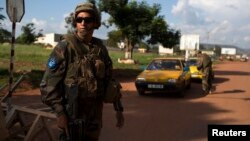PARIS —
French peacekeepers killed several militants during a three-hour battle on Monday after coming under attack from some 40 heavily armed unidentified gunmen in the northwest of Central African Republic, a French army official said on Tuesday.
Thousands of French and African troops have failed to stop the waves of intercommunal violence that erupted after mostly Muslim Seleka rebels seized power in March 2013 in the majority Christian former French colony.
"Elements of the Sangaris [French] force were attacked by a group of 40 heavily armed individuals," army spokesman Gilles Jaron said in Paris. "The clashes lasted three hours and some of them were destroyed - killed or injured. The others escaped."
Jaron, who declined to say how many were killed, said the troops had been tipped off that gunmen were heading to Boguila - about 450 km (280 miles) north of the capital Bangui - and had moved to protect the town. No French soldiers were injured.
"The clash was significant. The armed group was extremely aggressive and was looking to take the French position. We called in two fighter jets for support," he said.
Anti-tank guns and mortars were also used, he said.
Medical charity Medecins Sans Frontieres (MSF) said on Monday it had suspended all but emergency care in C.A.R. to show its "dismay" at the government's failure to condemn the killing of 16 people at its clinic in Boguila ten days ago.
"It could be the same armed group that committed those acts," Jaron said.
Seleka leaders stepped down in January under intense international pressure, but the peacekeepers and a weak interim government have failed to stamp their authority on the country, which has seen little but political instability and conflict since independence from France in 1960.
Seleka's 10 months in power was marked by killings and other rights abuses, prompting the creation of mainly Christian "anti-balaka" self-defence militia. About a million people have fled their homes and, according to human rights officials, parts
of the country have seen "religious cleansing".
Underscoring the depth of the crisis, peacekeepers escorted about 1,300 Muslims out of Bangui at the end of April, triggering looting and removing one of the last Muslim groups from the capital, deepening Muslim-Christian divisions.
The United Nations has approved a 12,000-strong peacekeeper mission to begin in September, although bringing it to full force is likely to take several months.
Thousands of French and African troops have failed to stop the waves of intercommunal violence that erupted after mostly Muslim Seleka rebels seized power in March 2013 in the majority Christian former French colony.
"Elements of the Sangaris [French] force were attacked by a group of 40 heavily armed individuals," army spokesman Gilles Jaron said in Paris. "The clashes lasted three hours and some of them were destroyed - killed or injured. The others escaped."
Jaron, who declined to say how many were killed, said the troops had been tipped off that gunmen were heading to Boguila - about 450 km (280 miles) north of the capital Bangui - and had moved to protect the town. No French soldiers were injured.
"The clash was significant. The armed group was extremely aggressive and was looking to take the French position. We called in two fighter jets for support," he said.
Anti-tank guns and mortars were also used, he said.
Medical charity Medecins Sans Frontieres (MSF) said on Monday it had suspended all but emergency care in C.A.R. to show its "dismay" at the government's failure to condemn the killing of 16 people at its clinic in Boguila ten days ago.
"It could be the same armed group that committed those acts," Jaron said.
Seleka leaders stepped down in January under intense international pressure, but the peacekeepers and a weak interim government have failed to stamp their authority on the country, which has seen little but political instability and conflict since independence from France in 1960.
Seleka's 10 months in power was marked by killings and other rights abuses, prompting the creation of mainly Christian "anti-balaka" self-defence militia. About a million people have fled their homes and, according to human rights officials, parts
of the country have seen "religious cleansing".
Underscoring the depth of the crisis, peacekeepers escorted about 1,300 Muslims out of Bangui at the end of April, triggering looting and removing one of the last Muslim groups from the capital, deepening Muslim-Christian divisions.
The United Nations has approved a 12,000-strong peacekeeper mission to begin in September, although bringing it to full force is likely to take several months.





